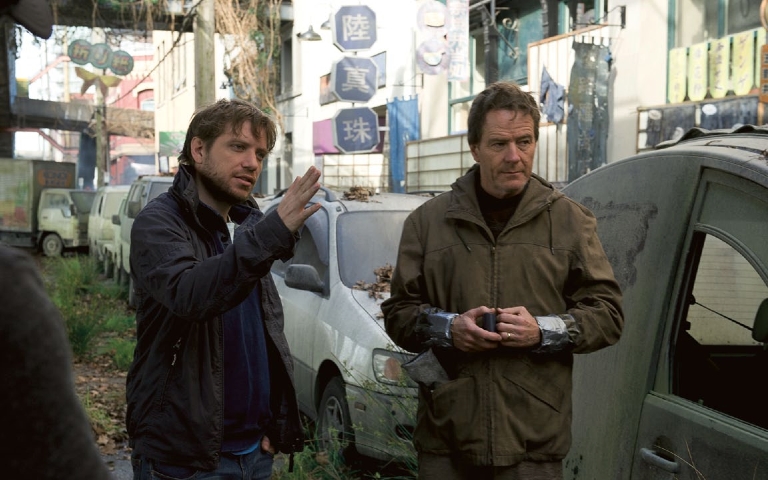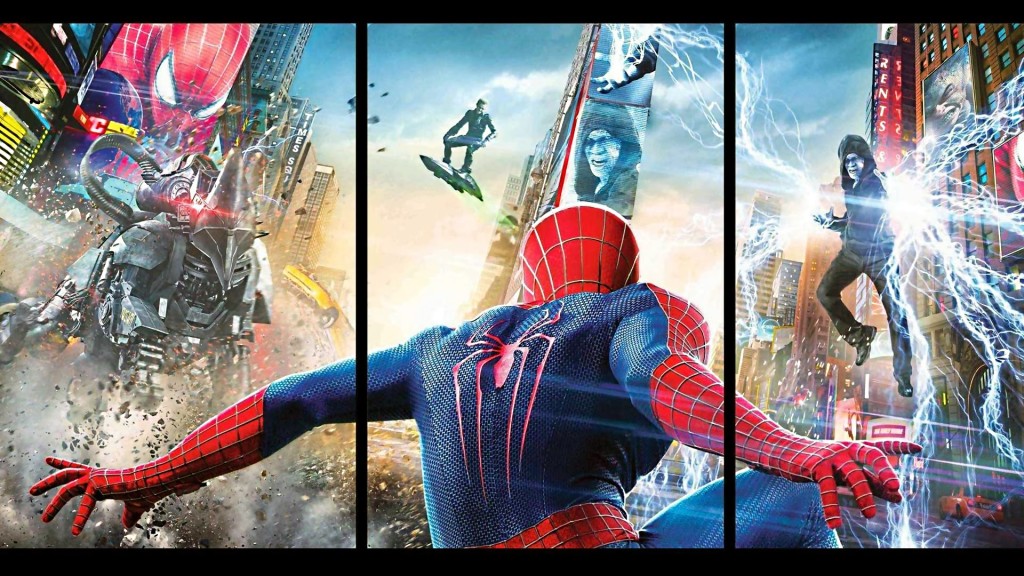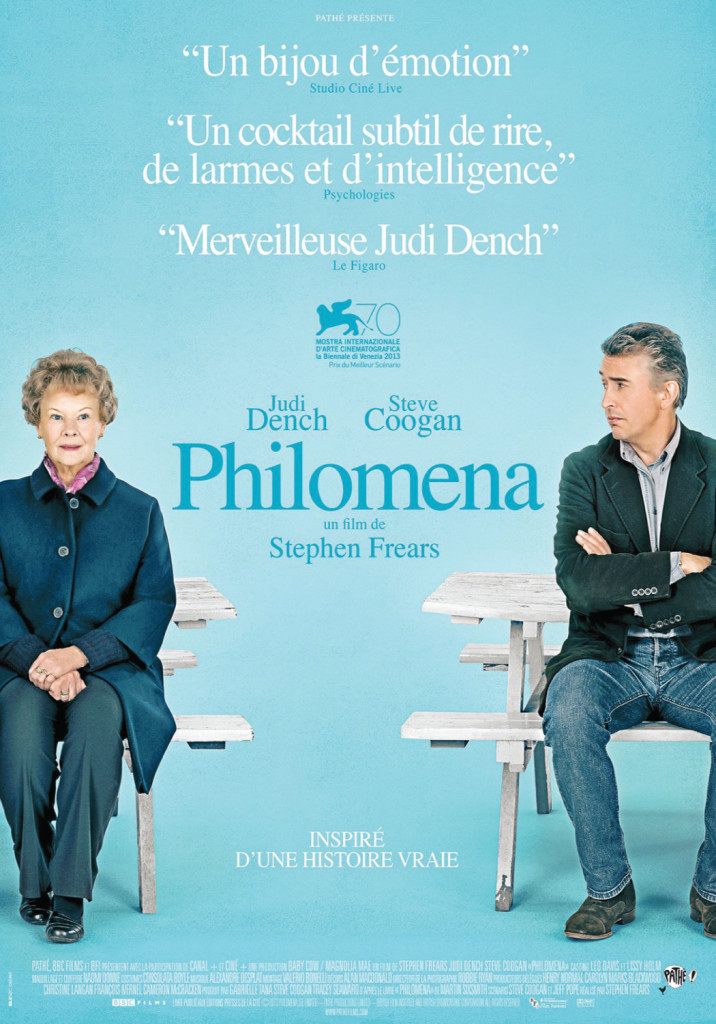Search Results for: the wall
Genre: Action/Adventure
About: The stars aligned for Gareth Edwards, a man who made the micro-budgeted “Monsters” a few years ago to show off his proficiency with special effects. The unscripted film followed a couple into a quarantined jungle where giant monsters lived. Naturally, when Godzilla execs saw what this man could do for 20 grand, they imagined pure movie-going nirvana at 200 million, resulting in the single biggest budget jump for a director in Hollywood history. The writer of Godzilla had his own megawatt rise to fame. Max Borenstein, a Yale alum, wrote and directed his first film back in 2003, called “Swordswallowers and Thin Man.” But it wasn’t until 5 years later that he was heard from again, when he landed on the Black List adapting Kenneth Feinberg’s memoir, “What is Life Worth?” He apparently landed on Legendary’s radar (the producers of Godzilla) writing the 2009 screenplay, Jimi, which chronicled Jimi Hendrix’s life.
Writer: Max Borenstein (story by Dave Callaham)
Details: 123 minutes
Gareth Edwards is one of the most exciting young directors out there. He’s got a directing street pass for his next five films as far as I’m concerned (I’ll be there opening day no matter what he makes).
What’s not exciting is the script he had to work with for Godzilla. Now, look – I don’t claim to know what it’s like to work on something with 30 chefs in the kitchen. There may be 3 or 4 people in that group tops who’ve actually read a screenplay before. So I get it. Script-by-committee, and an ignorant committee at that. But you’d figure someone with some knowledge of this stuff would’ve stepped in and said, “Hold up a second. This is spinning out of control here.”
Godzilla tries to show us that it’s more than just a monster flick right out of the gate, saturating the opening act with tons of “emotional” scenes. Even with Bryan Cranston acting in them, these scenes fall disastrously short of any emotion whatsoever. They actually exemplify one of the most misunderstood notions in screenwriting: that if you write people crying, then audiences will cry too.
Uhh, no. Except for rare occasions, that’s not how it works at all. Do you laugh when characters onscreen laugh? Of course not. You laugh when the characters find themselves in awkward or difficult situations, and struggle to get out of them. Watch the “answering machine” scene in Swingers, where you laugh uncomfortably for five straight minutes. Is Mikey laughing in that scene? I don’t think so.
So when we see Bryan Cranston’s character crying as his wife gets stuck inside a contaminated bay, do we cry? No. I mean, why would we? WE DON’T EVEN KNOW THESE PEOPLE! We met them three minutes ago. Why would I cry for someone I met three minutes ago?
This is only part of the problem though. The bigger issue is, why are Bryan Cranston and his wife in this movie in the first place??? (spoiler) They add zero value to the story, have less than 2% of an effect on the plot, and don’t even make it through the first act! Why are we spending so much time with people who aren’t even important enough to make it to Act 2????
Okay, breathe Carson. Breeeeathe. I’m sorry but the clumsiness of this script got to me. I mean, the trailers for this movie were awesome. I thought I was going to see a great Godzilla movie. Instead, we endure mistake after mistake that would’ve been spotted in a Screenwriting 101 class.
But I have to remember it wasn’t one writer sitting in a room with total control. It was the director, the producers, the actors, the testers, the actors’ agents, the executives, the toy people. All of these people had an effect on the script in some way. So my real beef is with that committee. But it doesn’t make what I saw any easier.
To give you a little background, here’s Godzilla’s plot: “Bryan Cranston’s Character” is a crazy scientist who works in Japan and is convinced that recent earthquakes aren’t actually earthquakes, but rather a sign that some monsters are living underground. But because he’s a kooky scientist, no one believes him.
He works at a nuclear facility, and one day there’s a meltdown which kills his wife (in a scene so melodramatic Tommy Wiseau, from “The Room,” would’ve chuckled). Cut to 15 years later and Bryan’s son is trying to distance himself from his increasingly erratic father, who’s still convinced that there are monsters under the earth.
Spoiler alert. There ARE monsters under the earth. And Bryan ends up dying when one of these monsters – a giant insect-like thing – emerges. Bryan’s son, a soldier with the U.S. army who now has his own wife and kid, tries to come to peace with never believing his father. But it doesn’t last long since a SECOND monster escapes the underground and the two start wandering about the planet, inadvertently creating destruction in their wake.
So you’re probably saying, why can’t we just blow these things up? Because they actually feed on nuclear energy. They also have an EMP bubble surrounding them wherever they go, shutting down all military equipment that comes close enough. Bryan’s son, essentially, then hitchhikes from one state to another (by boat, plane, car, train) following these beasts, as the writers desperately try and figure out a way to keep him involved in the story.
Eventually, the army realizes that the two giant insect things are trying to mate and they have no way to stop them. Enter Godzilla, whose desire to stop them is explained away in a single line: “He is trying to bring balance.” Trying to bring balance? Why? What does he care if these insects bang or not? Government needs to stay out of the bedroom.
After that, there’s something about setting up an analog nuclear bomb (that’s different from normal nuclear bombs) to lure all three monsters into the ocean and blow them all up. But before that can happen, Godzilla will try and “bring balance,” lizard style, to these pesky oversized mosquitos. Will he be overmatched, or become the mega-monster we all know him to be?
 All dressed up and nothing to do.
All dressed up and nothing to do.
Seriously though, what was the point of the first 20 pages of this story??? (Spoiler) A wife we don’t know is killed, leaving us with a husband who jaunts around for another 15 pages before he’s killed too???? I’ve never seen that before. Giving an emotional “death of a loved one” scene to a character who won’t even be around past page 30? You do that for your hero, not a one-and-done character! It’d be like giving a day player a major love interest.
As far as I can tell, the only necessary piece of information in the first 20 pages was the discovery of strange signals underneath the earth, which is something that literally could’ve been told in 30 seconds. Why not start the film with Bryan Cranston’s kid at his father’s funeral? Afterwards, he goes through his father’s old work, and finds the old recorded signal. This reduces twenty minutes down to five and gets rid of gobs of clunky insignificant nonsense in the process.
If only that were the only problem. What really killed this script was the exposition. There are certain stories that require tons of exposition, and either you figure out a way to minimize it ahead of time, or if it’s a script that requires non-stop explanation all the way through, you don’t write it. Because nobody wants to suffer through a story that’s 80% explanation.
That’s what Godzilla was to me. 80% explaining. And what happens when there’s more explanation than story in a movie? It feels lifeless. Because it’s never allowed to breathe! The majority of Godzilla’s scenes can be broken down into 5 categories. A) Explaining what these giant animals were. B) Explaining what they were doing (where they were going and why). C) Explaining how they operated (able to use EMP and nuclear energy). D) How the army would react to whatever current thing the monsters were doing. And finally E) How to get Bryan Cranston’s son from territory to territory.
Poor Bryan Cranston’s son. This guy had NOTHING to do but wait for the plot to figure out a way to get him to the next location. “Oh, hey, uhhh. He’s our… last nuclear tech engineer… so that’s why we need him to come with us!” Never have I seen a character so clearly a pawn of the plot rather than a real live human being before. He had no life because nobody wrote him any life. Calling home to the wife doesn’t make us care about someone. Or make them feel real. How about giving this character wants, needs, a flaw, secrets, a backstory (not his dad’s backstory – HIS backstory), a PERSONALITY!. He was so generic it was embarrassing to everyone involved. This is your hero! And he’s the most forgettable thing about the film! Even his dad, who died 100 minutes ago and wasn’t even needed for the story was more memorable.
So you might say, “Yeah, but Carson, the humans aren’t the real stars here. The monsters were.” Except that was a problem too! Godzilla was barely in the movie! This should’ve been called “Giant Insect Nuclear Lovebirds” because it was more about them than Godzilla. Granted, the moments where Godzilla did appear were badass (loved the blue fire), but they weren’t enough. This is supposed to be Godzilla’s movie, but there’s nary a Godzilla sighting.
Again, Gareth is an awesome director. The eye this guy has is insane. Every shot feels iconic. But if he’s going to become a great director, he needs to explore humanity more. He needs to care about his characters as much as he cares about his next shot. Or else he’s going to fall into that trap of making empty blockbusters that are all the rage for 1 week, and then forgotten forever.
Godzilla was a real disappointment. I was hoping for more. ☹
[ ] what the hell did I just see?
[x] wasn’t for me
[ ] worth the price of admission
[ ] impressive
[ ] genius
What I learned: If every other scene in your script is centered on explaining something, you have too much exposition in your script. You need to step back, figure out what the source of all this exposition is, and find a way to simplify it. If you don’t, your script is going to read like a “How to” manual instead of an entertaining movie.
Genre: Drama-Comedy
Premise: In a dimension where turtle people are movie stars and miniaturized people fight to the death, a speed-addicted alcoholic gambling private investigator must find out who kidnapped a miniature pop star.
About: This script was on The Black List all the way back in 2007. Since then, co-writer Tom Kuntz has gone on to be one of the most successful commercial directors in the business (he did that famous Old Spice ad with the guy walking around without a shirt). He also directed 2008’s The Onion Movie. Currently, I can’t find anything on co-writer Griffin Creech. Hope he’s still around!
Writer: Griffin Creech and Tom Kuntz
Details: June 8th, 2007 draft (126 pages)
 Devito for Turtle Man? I think so!
Devito for Turtle Man? I think so!
Turtle Man!
Half-turtle. Half man.
That’s all you need to know going into this one.
Actually, that’s not true. FWIW, I read The 37th Dimension 6 years ago. Believe it or not, it was once in my Top 25. Of course, back then I hadn’t read many scripts, but still. It was different. It was weird. It was the kind of script you still thought about after you put it down.
But the kinds of scripts I respond to today are different. I’m less impressed with flashy gadget-y scripts with a bag full of tricks and nothing else. I need some meat. There was this script called Fiasco Heights, for example, that wowed the reader out of me, purely because of its writing style. But that doesn’t happen much anymore. These days I need depth, I need character, I need something to dig my teeth into. Always a challenge in the minimalistic writing arena that is a screenplay.
So, naturally, I was curious what this new Carson would think of The 37th Dimension. Especially because I spend most of my time in this lame-o 7th Dimension. Take a trip with me 30 floors up, will you?
TOP 40 (that’s the name of a character by the way) is a beautiful pop star who just happens to be 10% the size of a regular person. Upon making a private appearance with a Japanese businessman, the businessman starts masturbating, leading to her trying to escape. But all of a sudden the lights go off, and when they come back on again, Top 40 is gone.
Enter Smith Dangerous Smith, a talented private investigator who see-saws between speed and booze to make it through what his more optimistic brethren refer to as “life.” He’s brought into Top 40’s music label to handle the case. See, it appears that whoever kidnapped Top 40, is now demanding a 20 million dollar ransom for her. Since Smith owes 700 grand to a gang of Haitian bookies, he agrees to the case faster than Selena Gomez breaks up and gets back together with Justin Bieber.
I’d be remiss if I didn’t mention Turtle Man, an advanced age half-turtle, half-man, who also happens to be a great actor. Well, WAS a great actor. Now he’s lucky to get a car dealership commercial. So upon backing his car up, ironically, into the van of those Haitian gangsters, he finds himself the recipient of the wrong kind of attention. They follow him home, try to kill him, only to see him duck into his turtle shell. Such is the goings-on of the 37th Dimension.
Also occurring in this dimension are 10% super ultimate fighter fights. This is when these 10% mini-people fight each other in a match to the death. J.T. Monahan, a Texas billionaire, carries the best of these fighters, Champ, around in a bowling bag. They’re so close that he even lets Champ watch him have sex (from his bag), which his lady friends naturally find kind of weird.
Smith, in the meantime, vacillates between getting utterly blasted and following up leads, which typically lead nowhere. From the Japanese man Top 40 did a private show for, to the little people collector, J.T. Burnham, to a plastic surgery doctor who’s so good he does his boob jobs in the back of his Bentley (which has built-in anesthesia) – everywhere he looks turns out to be a bust. When the music company bumps up the pressure and the Haitians start threatening death, it’ll be up to Smith Dangerous Smith to work a miracle and save Top 40 before it’s too late.
 Depp for Smith Dangerous Smith? Double thinks so!
Depp for Smith Dangerous Smith? Double thinks so!
This is how you do crazy.
A couple of weeks ago, I reviewed “The Lobster,” which was a mess from its pincher-shaped beginning to its crustaceous end. The rules were murky. The urgency was non-existent. It wasn’t even clear what our main character was trying to do other than stumble around his hotel and avoid getting in trouble. That’s not how you do crazy.
The best way to do crazy is to add non-crazy. In other words, you need a “normal” spine to hang crazy on. If you try to hang crazy on top of crazy, the spine won’t hold. There’s too much weirdness and everything buckles.
So yeah, even though we have a turtle man, Top 40, fight-to-the-death little people matches and weird Haitians (delightful bad guys, who are asked by Turtle Man, “What are you doing here?!” when they break into his house. Their answer? A polite, “Clearly we have gained unauthorized access to your dwelling.”), it works because they orbit around a stable narrative: Smith Dangerous Smith is trying to find and rescue Top 40.
Had Smith been, say, an alien, who ran around the city collecting butterflies, none of this would’ve worked. We needed him and his plotline to be normal so that everything else could be batshit insane.
With that said, I think the non-Smith elements of 37th Dimension could’ve been even crazier. Once you have that solid spine, you have to take advantage of the wacky rules governing your universe. There were really only two anomalies here – a turtle man and 10% people. And Turtle Man was, sadly, killed off early (R.I.P. Turtle Man). Two is such an odd number. At minimum you have to have three (everything comes in threes). And I’d probably go even further. Have other animal people. Have people who can perform magic. Do weird shit with the weather. This is the 37th Dimension. Not the 9th Dimension. Let’s get loopy!
Dimension was also way too long (126 pages). Maybe the writers thought for every extra dimension they got to write an extra page, but that’s not how it works. For these kinds of stories, it’s 110 pages tops. We ain’t watching William Wallace conquer England here.
I’m kinda sad that these guys split up, because I’ll see this a lot when talented writers first start out. They have a ton of weird ideas, which make their scripts memorable, but they haven’t yet learned the basics of structure – how to cut useless characters out, how to get rid of unimportant scenes, how to combine scenes, how to keep scenes focused so they don’t run on 2 pages too long. Cause if you write three scenes in your script that each run 2 pages long, that’s 6 extra pages you’ve added. That’s how you get up to 126 pages.
Over time, you learn how to curb these mistakes and your scripts get tighter, until you’ve segued from a “script that gets people talking” to a “script people want to buy.” Sadly, many writers don’t stick around that long, quitting before they figure out the magic code.
There’s a moment early on here, for example, where the music label brings in Smith to give him the info on what’s happened to Top 40. Afterwards, there’s a nearly identical scene where the police tell him what they know. These two scenes should’ve been combined, or the police scene should’ve been eliminated altogether. You could have easily fed in the info from the second scene into the first and cut out 2 pages.
Also, later in the script, a detective rails on Smith for being so inadequate. He keeps saying the same thing over and over again (that Smith’s inadequate) in several different ways. It takes up an ENTIRE PAGE. He could’ve easily gotten his point across in four lines, which means you’ve saved an entire page of screenplay real estate. True, there are times when you need your character to say more than 4 lines to get their point across, but those moments need to be big and worth it, which this one wasn’t.
Despite those problems, I think this could’ve been a movie. I don’t know if it can now because I don’t think these writers work together anymore and this would need a rewrite. But it’s different enough that I think it would bring in a big indie audience and possibly even break through into something bigger, especially if it got someone like Johnny Depp involved, who seems to have been created by the acting Gods for this kind of film.
We can only hope!
R.I.P. TURTLE MAN!
[ ] what the hell did I just read?
[ ] wasn’t for me
[x] worth the read
[ ] impressive
[ ] genius
What I learned: John Favreau was doing an interview for Jeff Goldsmith’s podcast, and Favreau was asked about his propensity for letting his indie films “breathe.” Why, Goldsmith wanted to know, didn’t he do the same for his bigger films? “Because audiences don’t like breathing,” Favreau replied, one-quarter joking. He went on to say that in a studio setting, they want the script to be tight. They want you to get to the point. In indie films, you can play around a little bit more. – There’s no right or wrong way to write a movie, of course. But if you want to get studio money, you have to learn to tighten your scripts. If not, the best you can hope for is a writing sample.
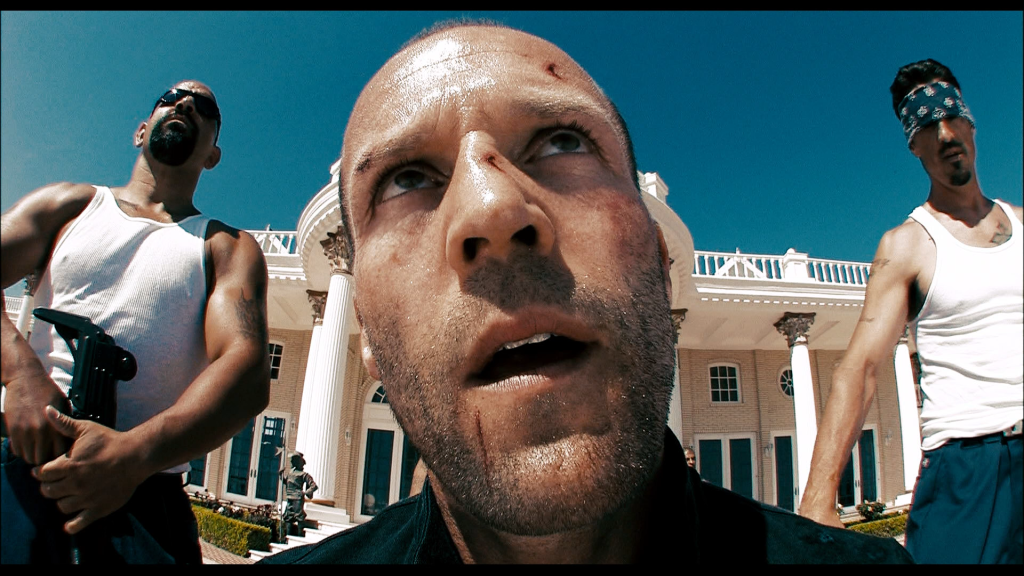 Jason Statham fully endorses #3
Jason Statham fully endorses #3
It’s one of the questions that never goes away for a writer. What should you write next? Write what you know? Write what you want? Write what’s going to make money? I don’t think there’s any one right answer. I’ve seen writers break in with a script they’re passionate about (Allan Loeb: “Things We Lost In The Fire”) and writers break in with a script that was purely market-driven. Ideally, the stuff you want to write would match up with the stuff that Hollywood wants to make, but it never quite works out that way, does it?
Then again, maybe you haven’t explored all your options yet. Maybe you need to see all those options to make an informed decision. That’s what inspired today’s post. I thought it’d be fun to show you the top ten types of movies Hollywood likes to make. These are the movies that keep popping up, year after year, and have been making the film industry moolah for decades. If you’re not writing within one of these genres, you’re not necessarily screwed, but you certainly aren’t making things easy on yourself.
A couple of caveats to this list. I don’t want to include anything that’s impossible for the average amateur screenwriter to write. So I’m not going to include comic book movies, high profile intellectual properties (Harry Potter, Twilight, The Hunger Games), or animated films. I’m also not including sub-genres that pop up every five years or so, stuff like submarine flicks, the body-switching movie, the inspirational-teacher movie, or the stoner-comedy. The whole point of this list is to show the TOP films that Hollywood likes to make year in and year out. Let’s take a look, shall we?
1) The buddy cop comedy – This sub-genre doesn’t need much of an explanation. Basically, pair two people up who have a job to do, make sure there’s a lot of conflict between them, and make sure it’s damn funny. This year it was Ride Along. Last year it was The Heat. Before that 21 Jump Street. The Other Guys. Going back in history, we had Rush Hour, 48 Hours, and Lethal Weapon.
2) The weepy romance – Destined to drive men everywhere mad, the weepy romance flick is primed for the young female audience to drag their boyfriends to. It’s recently been dominated by the Nicholas Sparks craze, but it’s been around much longer than that. I guess not surprisingly, these movies almost always have someone dying in them. The Fault In Our Stars, Love Story, Harold and Maude, The Notebook, The Last Song, The Lake House. Strange how soft and soothing all those titles sound. These films don’t do Transformers numbers, but they bring in the lady money.
3) The straight action thriller – These are usually very simple stories following a bad ass protagonist as he/she kicks a lot of ass in pursuit of a clear goal. Die Hard, Brick Mansions, Jack Reacher, Salt, James Bond, Wanted, Crank, Rambo. Liam Neeson has made this genre his bitch in recent years, but it’s been around long before him and will continue to be around long after.
4) The big action movie where shit gets destroyed – It could be aliens, monsters, zombies, whatever. Give us a movie big in scope where lots of shit gets effed up. World War Z, Independence Day, Godzilla, Pacific Rim, Cloverfield, War of the Worlds, The Day After Tomorrow, Battle L.A. Hey, where else can anyone destroy entire cities with just their MacBook. This is one of the coolest things about being a writer!
5) The safe female-driven comedy – This is an area where Hollywood has changed. This slot used to go to the classic romantic comedy, stuff like The Wedding Planner or Notting Hill. Now, these stories tend to be broader in scope with multiple characters. For the most part, the female audience who go to these movies want to watch female characters going through the same things they are, and laugh about it. The Other Woman, Sex and the City, Eat Pray Love, Julie and Julia, He’s Just Not That Into You, Mamma Mia. If you’re a man writing these movies, God help you with authenticity.
6) The classic high concept comedy – This genre is never going away. If you can come up with a clever big idea for a comedy, you can strike gold in the spec market and at the box office. High concept comedies are one of the few genres that can break through that stodgy box office top 10 full of sequels, cartoons, and comic books. The Hangover, We’re The Millers, Identify Thief, Night at the Museum, Tropic Thunder.
7) The action-adventure – Although increasingly difficult to break into this IP dominated field, if you can write a good one (which, by the way, usually requires its characters to wield swords, wear sandals, or both), you can start yacht shopping, because these don’t just make a lot of money HERE. They make a lot of money EVERYWHERE, as in all over the world. Pirates of the Caribbean, Braveheart, 300, Troy, Raiders of the Lost Ark, Immortals.
8) The big family comedy – One of the few huge genres you don’t need intellectual property for. These movies are usually divided into two categories – the literal family adventure, and the unique concept targeted at families. In the first category you have stuff like Cheaper by the Dozen, Parental Guidance, Blended and RV. And on the other end, stuff like The Tooth Fairy, Beverly Hills Chihuahua, Journey to the Center of the Earth, and Home Alone.
9) The straight horror film – This is a tricky one. Hollywood loves these films cause they cost so little to make and have such a big upside, but they’re more of a crapshoot than they look. Maybe you get the next Paranormal Activity. But there’s a much better chance you’ll get Would You Rather. Your best bet is to focus on a unique concept that you haven’t seen before, then write in the most complex characters you can. No character development in a horror script almost always leads to direct-to-Itunes. The Conjuring, The Sixth Sense, Oculus, Saw, The Exorcist, The Shining.
10) The serious subject matter vanity project – These are usually centered around the most complex characters of the year. So don’t even attempt to write one if the main character isn’t fascinating in some way. Also, they’re almost always based on real people, so you’ll typically have to snatch up the rights to someone in book or article form. Not as impossible as you might think. Sure, you’re not going to get the big players, like Johnny Cash, but there are plenty of people in this world who have lived captivating lives that haven’t had movies made about them yet. Other than that, this sub-genre is exactly what it sounds like. Write us a story centered around a very compelling individual that has the potential to win an actor an Oscar. The Wolf of Wall Street, The Aviator, Lincoln, Seven Pounds, Ray, A Beautiful Mind.
So why are these movies so popular? Well, outside of the obvious, that audiences enjoy them, these are the movies Hollywood knows how to market best. They know exactly how to draw up the posters, how to cut the trailers, how to snip together a TV spot. That makes them low-risk, and since Hollywood is risk-averse, that’s a match made in heaven. But it doesn’t mean if you’re not writing one of these that you’re screwed. Plenty of popular films don’t fall into these categories. Life of Pi, The Descendants, Argo, Magic Mike, Gravity, American Beauty, Slumdog Millionaire.
The difference is, because Hollywood knows these movies are going to be tougher to market, they’re less inclined to pick them up or produce them. Which simply means the journey to get your script purchased or made will be harder. As long as you know that and are okay with it, by all means take that chance (although you should be taking less chances the older you get). I believe your best shot at success is to look through the ten film types I’ve listed above, figure out which one you like best (the kind of film you actually go out and pay for) and see if you can’t write something in that mold. Not a copy. But a fresh angle that gives the genre a kick in the butt. That way you get the best of both worlds. You get to sell your script to Hollywood and you get to push the envelope some. I’ll be right here on the other side waiting to see what you come up with. ☺
You went searching for it, didn’t you? You went on a trek down the internet yellow brick road, through all its dark corridors and unsavory crevices, in search of the return of Mish-Mash Monday. You’d enjoyed it so much the first time, you just had to have more. It was like a moist Betty Crocker yellow cake with that chocolate frosting that’s light enough to float. I’d promised it would be back. So then why? Why did it disappear?
Well I have wonderful news for you, folks. Mish-Mash Monday is back! The special “Huge Screenwriting Advice” Edition. I’ll get more into that later, but first, I wanted to discuss one movie I didn’t see, and one movie I didn’t want to see, all in hopes of understanding this craft a little bit better.
It all starts with Spider-Man 2, a film I’d planned to see this weekend but couldn’t muster up enough enthusiasm to do so. I don’t know what it is about these Spider-Man movies, but if they were Christmas trees, they’d be that strand of lights right around the middle that’s always going dark. And no matter what you do, you can’t fix them.
I don’t know if it’s Andrew Garfield, who looks too tall and goofy to play the part of the web-slinger. I don’t know if the domination of the Marvel super-hero universe has made Spider-Man less relevant? I don’t know if the coolest aspect of Spider-Man (those fun POVs of him flying through New York) has run its course, not unlike Matrix bullet-time? But something’s definitely missing.
One thing that drives me bananas about these films is all the villains. Populating your superhero film with lots of villains so you can sell a bunch more toys is not a new idea. But Spider-Man always seems to go overboard with it. They almost look desperate, like they’re calculating, right there on the screen, that if they don’t have that third or fourth villain, they’re making 15 million less on toy sales and there’s no way they’re okay with that. I remember Sam Raimi complaining about this very problem in his last Spider-Man directing effort.
What the suits don’t realize is that this DOES affect the film. The justification for why a character is in a story is embedded into the very fabric of storytelling. The second a character feels wedged in for reasons other than the story itself, something starts to smell fishy to the audience. As writers, our job is to hypnotize. It’s to make the audience believe in what we’re telling them. And if you start planting things in that don’t make sense, the hypnosis starts to crumble, and before long, they’re no longer under your spell.
I watch these Spider-Man 2 trailers and you have Green Goblin, Rhino, Electro. It feels unfocused, like they’re unsure what the movie is actually about. That’s not to say other famous super-hero movies haven’t done the same. The gold standard for superhero franchises, Batman, had Two-Face and The Joker. But, for the most part, Nolan gave us one villain per Batman film, and he made that villain the star villain.
That’s the other thing. When you focus on one villain, you can actually give them depth. You can make him a worthy adversary to your hero. When there are two or three other guys, we’re only getting the bullet points of each villain. You don’t have enough time to delve into them, and the films feel more surface level as a result. So I’m not surprised to hear that’s a criticism these last three Spider-Man films have faced.
On the flip side of that world is a small movie I saw last week. You know a movie’s good when it doesn’t need pyro-technics or VFX wizards or a half-dozen car chases to keep you entertained. All it needs is people and words. Which is why, so far, Philomena is my favorite film of the year.
For those who haven’t seen the film, it’s about a journalist, Martin, who’s recently lost his job. He somehow gets sucked into a human interest piece about a former nun, Philomena, who was forced to give her baby up for adoption 50 years ago by the nuns at her convent. Philomena wants to find her son and meet him for the first time.
The first thing I loved about this movie was the RESISTANCE they built into the main character pairing. Any time you team up two people to find something (in this case, the woman’s son), you want to create resistance between them (from one, the other, or both), as it adds conflict. It’s not overdone here. This isn’t Ride Along. But Martin isn’t happy that his career has devolved into escorting a rambling senior citizen around the country. It adds such a charming sense of humor to the relationship, that even if there were no story at all, you’d still enjoy watching these two, something every “two-hander” should strive for.
But it was the MYSTERY that got me. I thought this was going to be one of those non-dramatic self-important indie films where two mismatched people drive cross-country and learn something about each other. But it was much more than that. I’ll tell you why.
It coincides with the exact moment I got hooked, which was when Philomena and Martin go back to the convent to ask for the records on her son. The Head Nun is very skittish and borderline rude, almost to the point that she seems like she’s hiding something. Hiding something is ALWAYS good for screenplays. Secrets are what make drama go round.
The nun tells Philomena that all those old documents were destroyed in a fire. There’s nothing they can do. She does, however, locate something Philomena signed a long time ago, where she promised never to go looking for her child. While they’re able to convince an old woman easily, Martin’s not so sure. Curious, he points out, that this ‘great fire’ destroyed every single piece of information that would help Philomena find her child, yet has preserved the one piece of paper that would prevent her from doing so.
I don’t know what it is about this simple set-up: bad people trying to screw over good people, but if you do it right, it’s so damn effective. However, Philomena finds a way to add a turbo boost to that tried-and-true setup, one you, as a screenwriter, should always keep in your bag of tricks as well: IRONY.
If these were, say, big corporate assholes preventing Philomena from finding her son, we’d be upset, but we wouldn’t be surprised. Men like that are expected to act that way. It’s that this a group of NUNS who are doing this that gets us. The people who are supposed to be the most trustworthy are screwing our main character over. That’s what draws us in, that terrible people masked as righteous people are screwing a poor helpless old woman over. That’s why we want to stick around. Irony. Never forget how powerful it can be!
Ahh, but that isn’t the only lesson you’ll learn today. I have one more mish-mash story I’d like to add to today’s post.
Awhile back, I was chatting with a writer whose script I’d read. The script was pretty good, but it had a big problem: It wasn’t marketable. Based on how these movies had done in the past, I didn’t think anybody would go and see it. When I tried to explain this to the writer, he vehemently disagreed. He insisted lots of people would show up. I made my arguments. He made his. Then at some point, we realized that neither of us were going to change each others’ minds, and we moved on.
Many months later, a movie came out that was very similar to this writer’s script. It wasn’t the same idea, but it was the same genre, same tone, same dark main character, same TYPE of story across the board. The movie did poorly at the box office, but I was long past proving my point. It was just something I passively noted.
Not long after, I ran into the writer again. After catching up, I remembered the film and I was curious about what he thought of it. I didn’t bring up any of our previous conversation. I just asked, like you would any movie, “What did you think?”
To my surprise, he replied, “I don’t know, I didn’t see it.” “Didn’t see it?” I thought. What did he mean he didn’t see it? This was the exact kind of script he was trying to sell.
And then it hit me. He didn’t go see it because he wasn’t interested in it. He wasn’t interested IN THE VERY TYPE OF FILM he was writing. I pointed this out to him and at first he was dismissive. He made some comments about how the two plots were different.
But as the night went on, I could see his mind working. Finally, it dawned on him. That movie WAS very similar to his, and he’d never even considered checking it out. If HE, the very writer WRITING these kinds of movies, wasn’t interested in seeing this film, why the hell would he expect the general audience to do so?
It was a valuable lesson to both him and myself: Don’t write a movie that you wouldn’t go see yourself. It seems like the most obvious advice in the world, yet I’m constantly reminded how many writers ignore it. I remember this guy who used to write all these goofy comedies that never quite got the tone right. It occurred to me after awhile that I never saw him actually go to any of these movies. So I asked him one day, “When was the last goofy comedy you actually paid for?” He thought about it for a moment, then conceded he couldn’t remember. Of course you’re not going to get the tone right if you’re not even interested in watching those kinds of films.
Guys, you have to be realistic. If you’re not paying your hard-earned money to see the very types of movies you’re writing, then why would you expect anyone else to? It’s hard to put butts in seats. Hollywood spends billions of dollars to figure out how to do it. But the cheapest research is also the most telling. If your movie can’t even get you to show up, you shouldn’t be writing that movie.
Mish-Mash Monday out!
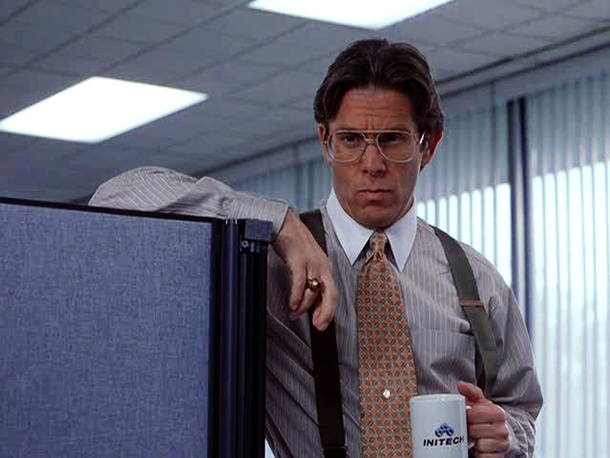 Would you rather work with this guy…
Would you rather work with this guy…
I feel bad about last week’s negative article. So I wanted to change it up today. Two things happened to me in a matter of hours Tuesday that reminded me of an essential quality all screenwriters must have in order to succeed.
It started when a writer informed me about an article they’d read in The Hollywood Reporter. In it, an anonymous working screenwriter complained that the life of a professional screenwriter, for the most part, sucks. The writer who’d read the article was upset. They said, “I’m working so hard to climb up this mountain, and this is what the end result will be? Misery 90% of the time? Why bother?”
I always get a little down when I hear these stories, and I’ll explain why in a second. But that afternoon, I had a meeting with another writer. For the record, this is a writer who’s had some success, but is nowhere near where he’d liked to be. He had this big smile on his face when I arrived and relayed how excited he was to talk about all the stuff he’d been working on. Before long, he was passionately telling me about all of his projects.
It didn’t even feel like a meeting. It felt like two people who love movies talking about writing them. I left that meeting with a noticeable hop in my step. Nothing earth-shattering happened. But I was happy. Why? The answer is simple. This writer’s overwhelming positivity had rubbed off on me. It had gotten me excited. It made me completely forget about that ridiculous article.
But something much bigger came out of that meeting. I realized how easily negativity can influence a writer’s life, and how quickly it can spread to others.
If that writer I’d met hadn’t been so immediately positive, I probably would’ve brought that negative energy into the meeting, and things would’ve gone very differently. Maybe I would’ve brought up the article, maybe we would’ve spent 30 minutes discussing if we thought it was true (being a professional writer sucks), then when the writer pitched me his ideas, they would’ve been laced with a sense of hopelessness, born out of our incorrect belief that making it was “impossible.” I would’ve left the meeting bummed out, and it would’ve taken me a day or two to get back to being excited about the business.
The thing about writing is that it’s such a lonely endeavor. And because you’re alone a lot of the time, your mind often drifts into the negative. “Can I do it?” “Is it impossible?” The doubts start creeping in. Rumors about how the only people who make it are those with family connections, or how nobody’s buying specs anymore, or how minorities don’t stand a chance, or how you have to live in Los Angeles to succeed.
Pay attention to what I’m about to tell you because it’s an often overlooked but ESSENTIAL component to your success in this business. Ready?
Negativity begets Negativity.
I know how crazy it sounds, but if you believe you’re never going to succeed, you won’t. You just won’t. Because you’ve already decided that you won’t. You’re just waiting for the official confirmation.
If you believe you’re going to succeed, you’ve got a chance. Because you believe. And as long as you believe, you’ll continue to make others believe.
You can see how that tiny insignificant Hollywood Reporter article spread like a virus from the original reader, to me, and almost to the other writer I met. Luckily a good dose of screenwriting chemo destroyed that negativity before it was too late. The only way to make sure that didn’t happen again was to stay away from that kind of person, the kind who complains, who hates, who sucks the life out of things. Positive successful people try to avoid those folks like the plague.
Again, if you believe in the negative? If you exhibit negativity? If you present yourself as a negative person, the majority of the experiences in your life will be negative. Negative people attract negativity. Positive people attract positivity.
Now I don’t know who this writer is in the Hollywood Reporter article. And I understand that his article is a tiny sample size of his career, but I’d make a strong case that the reason he isn’t as successful as he wants to be has a lot to do with how he sees the world. He sees screenwriting as a soul-sucking miserable existence. And there’s no way to mask that. Every meeting he goes to, every person he chats up, every job he’s up for, they see that. They feel it seeping out of his pores, or projected deep within his eyes. His negative posture, his lack of general happiness. They feel it, and they don’t want to be a part of it.
I used to think that it should be all about the writing. If the person is a good screenwriter, who the hell cares what they’re like? But I realize now how naïve that was. I still think it’s true for SUPER-STAR writers (David Koepp and Frank Darabont). But for everyone else, it matters tons. Some of the people I’ve met are such soul-suckers, that working with them for five minutes would depress the hell out me, much less five months. Even if the negative writer is the better writer, is it worth them always miserable, always complaining, always fighting every note, and generally hating work? It might take longer with the lesser writer, but their eagerness to get it right will trump the problem writer every time.
Negativity begets Negativity.
I’m going to tell you a story that I’ve only told a few times (and have alluded to in my book) because I’m actually quite embarrassed by it. But it’s a story that completely changed how I approached life. This happened a little bit before I started Scriptshadow when I was a REALLY negative person. I was that annoying guy who always found fault in everything. I was always complaining about the business, hating on every movie, commenting on how stupid the entertainment business was. I was like Grendl on crack.
A lady friend at the time delicately suggested I read The Secret. She thought it would be good for me. Now if you don’t know what The Secret is, it’s this book/movie/audio-tape “way of thinking” by which a soothing Australian woman tells you to do things like “imagine success” and success will come to you. “Imagine money” and money will come to you. Your basic new age hooey-phooey.
But I was in a really low place and knew that my negativity had reached dangerous levels. So I thought, “What do I have to lose?” and started listening to the audio version of the book while I exercised. If you haven’t heard this woman, it’s quite amusing. She has this over-the-top hypnotic voice that promises you the world if you just think positively.
I started listening to it more as a source of entertainment than enlightenment. But the woman started issuing challenges. She’d say things like, “Go out and say five positive things to people today.” For shits and giggles, I’d do it (“Hey, that’s a nice watch,” I’d say to the cashier at the supermarket) and I must admit I was surprised by the response. People would offer back a genuine smile, thank me, and even start up conversations. More importantly, after every interaction, I felt better. And when I’d talk with friends later, they’d note that I was uncharacteristically “upbeat.” Without me even knowing it, these positive experiences had started to improve my life.
But when the chapter about money came up, I couldn’t play the game any longer. What Nutty Soothing Australian Woman was saying was ridiculous. She posited that if you “thought” and “believed” that money would come to you, it would. In fact, she said, it would just show up in your mailbox in the form of a check. Money by just wishing for it! Who would’ve thought it was that easy!
I had never heard such blatant bullshit in my life. I had NEVER received money in the mail. Not once. So I decided to play a game with Nutty Australian Woman to prove her wrong. Over the next month, I would be genuinely positive about everything, and wherever I went, I’d believe – just like Nutty Australian Woman told me to – that I should receive money.
Over the next three weeks, I found my life improving dramatically. If a movie I didn’t like did well at the box office, I wouldn’t complain like I used to. I’d think, “Good for the writers.” I was genuinely happy for them. If somebody said something mean about something online, I’d try to find something positive to counter it. It almost became a game. No matter how negative a situation got, could you find a positive way to respond to it?
I noticed my friends were happier to be around me (I wasn’t interrupting every fun moment complaining about something), and because they were happier, I was happier. That’s the great thing about being positive. Whatever you give out comes back twice as strong.
But it was three weeks into my experiement that one of the biggest shocks of my life happened. When I went to get my mail that day, there was an envelope from the city of Los Angeles. I opened it up, and there was a check for $75. I shit you not. The letter was in regards to a parking ticket I had received last year. They went on to say they had made a mistake in the ticketing process, and were therefore refunding me.
Now as anyone who lives in Los Angeles will tell you, the LA parking ticket system is one of the most obsessive corrupt institutions in the world. They will wait at your car until your meter runs out in order to ticket you 1 second later. They’d rather commit Heaven’s Gate-level mass suicide before issuing a refund. I’m pretty sure I was the first person in the city’s history to receive money back for a ticket.
I couldn’t believe it. That freaking Nutty Australian Lady was right. I had received money in the mail. I was so excited (good God did I need that money), I had a newfound optimism about the world. That optimism led to me getting the confidence to do a lot of other things I’d been putting off. One of those things, a few months later, was starting Scriptshadow.
Now look. I’m not going to sit here and tell you you have to believe in some New Age Hooey in order to succeed. What I can tell you, from personal experience, is that trying to find the good in everything instead of wallowing in the bad, positively alters the way others perceive you. People will want to be around you. They’ll want to work with you. They’ll want you in their lives.
Positivity Begets Positivity.
And look, it’s not easy at first (especially if you’re inherently negative), and I still struggle with it at times (I’m not sure how positive I was yesterday, although analysis does require certain negative reactions), but I’m telling you, it’s the unsung hero of success. And I just want you guys to know that the more positive you are, the more opportunities you’re going to get in this business. I can promise you that. Don’t believe me? Give it a shot.

